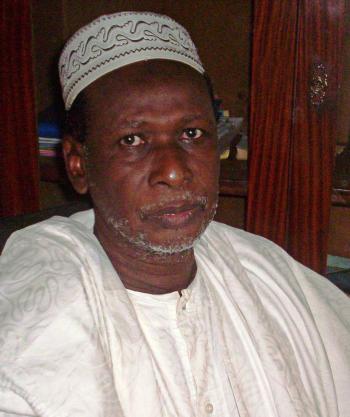Posted on May 16, 2011
Note: This post was written in French and translated for the benefit of Archival Platform readers. The original version follows below the translation.

Around the 14th century, Djennã became a major centre for Islamic studies and, with local scholars writing their own works, this gave rise to a sophisticated marketing and reproduction industry: copying, illumination, binding, commercial and educational distribution channels. The Landourã family is part of a clan which arrived in Djennã in around the 15th century. As a marabout family, they were fortunate to live through the era when these Arabic and Islamic books were reproduced. This is why they have the manuscripts today. The Landourã family possessed a total of 3000 manuscripts up until 1964, the time of the patriarch's death.
Since then, the manuscripts have lain forgotten, exposed to the elements and badly preserved. Lack of awareness of preservation methods has thereby greatly contributed to the library's deterioration. When the existence of the manuscripts was remembered, the only solution the patriarch's younger brother could find was to salvage a few of them and throw the rest into the river. Hearing of this, I, as a Cultural Heritage Officer and with the agreement of the family members, decided to create a library in order to be better able to preserve the rest of the manuscripts. The aim was to allow researchers and historians to benefit, if possible, from their use. And so the Alpha Seydou Landourã Manuscript Library was established, thanks to the support of the NGO SAVAMA - DCI, on the 16th of April 2010, under the patronage of the Ministry of Culture. The manuscripts deal with theology, Islamic law, grammar, literature, the translation of the Koran, philosophy, history and astronomy.
The Alpha Seydou Landourã Manuscript Library aims to ensure better preservation and promotion of the manuscripts and to allow the communities of Djennã and the surrounding areas to reclaim them. It will also build a new structure to house not only the library but also a resource centre to allow researchers and school and university students to gather information. The library seeks to work with manuscript custodians, train librarians and binding and calligraphy specialists, as well as save the ancient manuscripts in digital media formats.
Ahmadou Hama Landourã is a retired National Cultural Heritage Officer in Mali and runs the Alpha Seydou Landourã library.
Bibliothèque des manuscrits Alpha Seydou Landourã
La ville de Djennã se situe dans la rãgion de Mopti (5ème rãgion ãconomique du Mali) à environ 675 km de Bamako sur le fleuve Bani. Fondãe vers le VIIIème siècle de notre ère, elle est une continuitã de Djennã-Jãno fondãe 250 ans avant Jãsus Christ. La ville eut la chance de vivre toutes les ãpoques glorieuses qui ont marquã l'histoire du Mali (de l'empire du Ghana à la Dina de Sãkou Ahmadou en passant par le Mali, le Songhoy, les Royaumes Bamanan de Sãgou et des Toucouleurs).
Vers le 14ème siècle, Djennã est devenue un grand centre d'ãtudes islamiques et où les ãrudits locaux ãcrivaient leurs propres ouvrages donnant ainsi naissance à une industrie sophistiquãe de reproduction et de commercialisation (copie, enluminure, reliure, circuits de diffusion commerciale et ãducationnelle).
La famille Landourã fait partie d'un clan qui est arrivãe à Djennã vers le 15eme Siècle .Famille de marabout elle a eu la chance de vivre l'ãpoque de reproduction de ces livres arabe et islamiques .C'est ce qui lui a permis d'avoir aujourd'hui des manuscrits.
La famille Landourã comptait 3000 manuscrits jusqu'en 1964 date du Dãcès du patriarche.
Depuis, les manuscrits sont restãs dans l'oubli et vãcurent des intempãries et dans une mauvaises conservation. Ainsi la mãconnaissance des moyens de conservation a beaucoup contribuã Ã une dãtãrioration de la bibliothèque.
Et quand chacun s'est rappelã de l'existence de ces manuscrits le petit frère du patriarche n'a trouvã d'autres moyens que de rãcupãrer quelques uns et de lancer le reste dans le fleuve.
Informã de cela et ãtant agent du patrimoine culturel j'ai dãcidã avec l'accord des membres de la famille de crãer une bibliothèque pour mieux pouvoir conserver le reste des manuscrits afin de les faire exploiter si possible par les chercheurs et les historiens
C'est ainsi que La bibliothèque des manuscrits Alpha Seydou Landourã à ãtã installer grâce à l'appui de l'ONG SAVAMA – D.C.I le 16 avril 2010 sous le haut patronage du Ministère de la Culture.
Les manuscrits sont en thãologie en droit islamique en grammaire en littãrature en traduction du coran en philosophie en histoire et en astronomie.
La bibliothèque des manuscrits Alpha Seydou Landourã ambitionne d'assurer une meilleur conservation, une promotion des manuscrits et de permettre leur rãappropriation par les communautãs de Djennã et environ. Il s'agira aussi de construire une nouvelle structure qui va couvrir non seulement la bibliothèque et aussi un centre de documentation pour permettre aux chercheurs, aux ãlèves et aux ãtudiants de se documenter. Elle souhaite travailler avec les dãtenteurs des manuscrits, former des bibliothãcaires, des spãcialistes en reluire et en calligraphie. Sauvegarder sur des supports de pointe (numãriques) les manuscrits anciens.